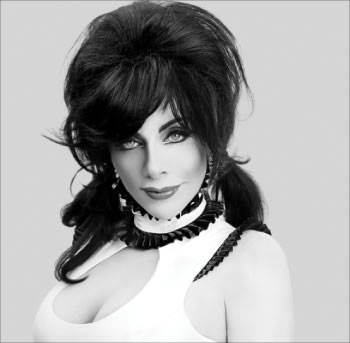BY GARY M. KRAMER
Josie Cotton, recalling an early career flap, is back with her notorious anthem
Singer/ songwriter Josie Cotton is best known for asking the musical question, “Johnny Are You Queer?” But the 1982 hit had a queer effect on her career. When she was shopping her first record around, IRS Records offered to sign her — if she dropped the song “Johnny.”
“I had to make a life-altering decision,” she recalled in a recent phone interview. “IRS was THE label of choice for musicians in the 1980s, but to compromise myself so early in my career seemed like such a cowardly thing to do. I was very aware once I recorded that song that I would always be the ‘Johnny Are You Queer?’ girl, but it was a conscious decision on my part.”
Despite her integrity, the song became a public relations nightmare. Although the “Johnny” was an international phenomenon in the dance clubs, Cotton recounts that “once the political firestorm started Electra [the label that did sign her] got cold feet. They pulled it from the charts, stopped filling orders, even canceled the video for ‘Johnny’ the night before the shoot.”
“‘Johnny’ was banned in Amsterdam, but went to number 2 on AM radio charts in Canada,” Cotton recalled. “In America, on the West Coast, it became an anthem in the gay community, empowering folks to come out of the closet. But on the East Coast, some gay groups and gay publications really believed ‘Johnny’ was homophobic. Radio programmers were nervous because they thought it was a gay record. The religious right televised on their TBN network that Josie Cotton was actually a gay man promoting homosexuality, and ‘Johnny’ was used for brainwashing purposes in sleep deprivation programs for Christian re-education camps in the South.”
Regardless of the responses to the song, does Cotton, who is straight, have a real Johnny as inspiration?
“I’m sure there were many, many, many Johnnys, but I never met him, and I never had that experience of falling for someone who was gay. At least not yet!” Cotton laughed, “It wasn’t interpreted by me as a personal experience; it was more of a character — a pretty, dumb girl who’d fallen for a gay guy.”
The idea of interpretation and performance is very near and dear to Cotton. When she first moved out to LA, she had the acting bug, although she ultimately chose music over acting. “I had to focus on one or the other,” she explained.
While her music started out New Wave, Cotton has covered ’50s girl group songs, like “Tell Him,” as well as made rocker grrrll songs such as “Maneater” which appeared on her “Invasion of the B-Girls” CD. Her latest musical effort, “Pussycat Babylon,” has a 1960s Asian flavor, and includes two songs she’s performing this Pride season — the dreamy, atmospheric “See the New Hong Kong” and the rockin’ title track.
Cotton describes her influences as ranging from Tim Burton/ operatic trailer trash to all things Asian — from Japanese toys and anime art, to Mao Zedong. But her greatest influence, she insisted, is the Italian “sex bomb” Gina Lollobrigida.
“I have tried on many different personas, but I have returned to my original inspiration, she said. Even musically right now I feel most myself in the exotica/ cocktail / lounge music genre like the soundtracks in those Italian movies of the 1960s. It does something to me, like making me want to shamelessly flirt and run through marble fountains in an evening gown.
All that could just be a conceit for one or another music video, but Cotton claimed she genuinely enjoys playing around with identity and sexuality.
“I’ve fully embraced my own sexuality, but I have always been confused about the role I was cast as a female ’cause I never felt like a girl,” she explained. “I explore that on the new record — probably on every record I ever did.”
She added, “It’s amazing to me I’m not a lesbian.”
And while it remains to be seen if her new work will have the impact her initial hit did, one question remains: Given all the hullabaloo, does Cotton feel queer fans have embraced her for “Johnny?”
“I made a very controversial record which impacted my career in unfathomable ways and then I disappeared,” she observed wryly. “No one ever knew the whole story and that’s largely my fault. But do I feel I was ever acknowledged for what I went through over a word that wasn’t even my issue? Not by the community at large, but I have been personally thanked countless times by many gay guys — and that’s made it all seem worth it.”




































